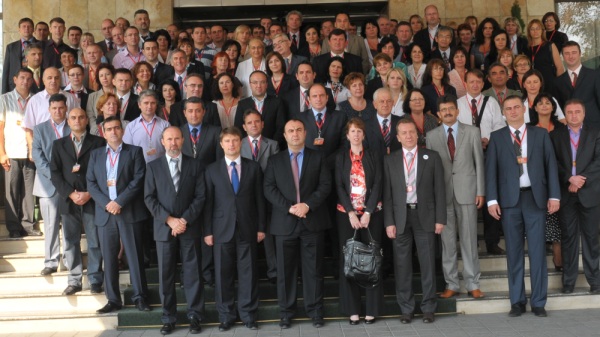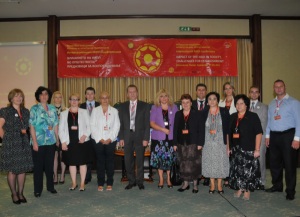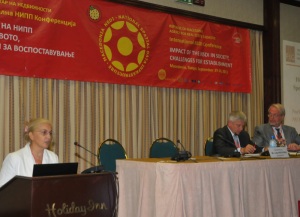Impact of the NSDI in the society, Challenges for
establishment, International NSDI Conference
19-20 September 2011, Skopje, FY Republic of Macedonia
|

The participants at the conference |
The International NSDI Conference on “Impact of the NSDI in the society,
Challenges for establishment” was held in Skopje between the 19th and 20th
of September 2011. It was organized by the Agency for Real Estate Cadastre
(AREC) and the Faculty of Civil Engineering. FIG and EuroGeographics were
co-organizers. FIG was represented by vice President Chryssy Potsiou,
who presented the 2011-2014 Work Plan of FIG and its major targets. The
conference was also supported by the World Bank, the Netherlands Kadaster,
Swedesurvey AB, City of Skopje, GDi GIS Data, IGEA Mak, as well as by Asseco
SEE.
The technical programme included 37 presentations; the conference was
attented by 130 participants from 22 countries. All participants have
acknowledged the excellent work and remarkable hospitality of the Director
General of AREC Mr, Ljupčo Georgievski and his staff. You may find
more about the conference and its conclusions in the following report
provided by AREC and the organizing committee of the conference.
Conclusions from the conference
The international NSDI Conference which was organized on the 19th and
20th of September 2011 in Skopje, has been considered as a highly
professional event that shall contribute to the promotion and development of
NSDI in the FY Republic of Macedonia, and in the greater region as well.
The conference has been organized by the Government of the FY Republic of
Macedonia, the Agency for Real Estate Cadastre (AREC) and the Faculty of
Civil Engineering. The role of co-organizers was entrusted to FIG -
International Federation of Surveyors, and to EuroGeographics - European
Association of National Mapping, Land Registry and Cadastral Agencies.
The conference was supported by the World Bank, the Netherlands Kadaster,
Swedesurvey AB, City of Skopje, GDi GIS Data, IGEA Mak, as well as by Asseco
SEE. We would hereby like to thank all organizers, co-organizers, and
supporters of the Conference for organizing such a significant event for the
FY Republic of Macedonia, whereby the mapping and agencies for cadastre of
the countries in Europe and in the region, had an opportunity to exchange
experiences and knowledge in the area of NSDI - an area in which they play a
leading role as coordinators and implementation bodies.
The conference topics were determined by an international organizational
committee consisted of 9 members, all of them are prominent representatives
of institutions and professors.
73 authors from 12 different countries have offered their contribution to
the Conference by expressing their views on NSDI and its related scientific
branches in 37 presentations, divided into 6 technical sessions and 1
commercial session.
The authors' abstracts were reviewed by an international review
commission which was consisted of 3 members, who are prominent professors.
The Vice-Prime Minister of the Government of the FY Republic of
Macedonia, the Minister of Information Society, the Mayor of the City of
Skopje, as well as a High Representative of the World Bank addressed the
audience at the Conference. During the opening session of the Conference,
presentations were held by the Director of the AREC and the Executive
Director of EuroGeographics.
A total number of approximately 130 participants from 22 countries around
the world attended the Conference.
Based on the addresses, presentations, presented materials and
discussions realized during the Conference, the following conclusions can be
derived:
- In the two years preceding the conference very good progress has
been achieved. Nearly all countries in the region have recognised the
importance of NSDI, for the sustainable development in their countries
(economic, social, and environmental), and set up NSDI-initiatives (e.g.
national geo-portals, legislation). Those that have not are eagerly
making plans to do so;
- The directive of the European Union for the establishment of an
Infrastructure for Spatial Information in Europe (INSPIRE), and related
development experiences gained over the past decade, is the model to be
actively considered as the ‘blueprint’ for NSDI-development;
- INSPIRE is the legal framework for NSDI in Europe, but also beyond
it. More needs to be done by the European Commission and other bodies to
coordinate national SDI activities if the goal of a European Spatial
Data Infrastructure is to be achieved;
- The current situation of SDI-development in the region is similar to
other regions in Europe.
- Significant benefit has arisen for countries in the region from the
exchange of NSDI experiences. This should be strengthened and extended
to include organisations active in the field of NSDI;
- There is a need to present information about NSDI in terms familiar
to politicians and officials making key decisions to help them
understand the social, economic and environmental benefits of NSDI, and
its relationship to other E-government initiatives;
- The funding for supporting the NSDI-development has to be
appropriate and sustainable;
- More should be done to raise awareness, particularly in governmental
institutions and significant benefits to civil society, including
businesses of the importance of NSDI;
- NSDI is a tool which enables better decisions in government,
businesses and citizens personal lives; in addition, it also enables
better governmental service delivery to companies and citizens and
improves policy-making.
- Most NSDI’s are technology/software enabled, and have established
a central point connecting spatial data/services, users/partners and
systems; the issue of interoperability and data harmonisation issue
needs
full attention for having successful NSDIs in the future.
- Most benefits in NSDI can be achieved when all sections of society,
governments, businesses, academia and citizens work strongly together;
- The role of National Mapping and Cadastre Agencies (NMCA’s) is
considered as crucial in providing knowledge and key datasets,
increasing
the NSDI-awareness, building capacity, and supporting the coordination.
- Knowledge and practices on NSDI-development relevant for the region
are considered as value to be shared among stakeholders (e.g. examples
of good NSDI-practices at different administrative levels);
- Most benefits in NSDI can be achieved when all sections of society,
governments, businesses, academia and citizens work together;
- For building more capacity in the region, it is important to invest
in
education at different levels dealing with the principles and concepts
of
NSDI.
- The topic of NSDI-monitoring and reporting needs more attention.
- Regular NSDI-conferences in the framework of the INSPIRATION-project
and their integration with annual regional conferences on cadastre are
needed and recognized.
Finally, the participants would like to congratulate the Director General
of AREC Mr, Ljupčo Georgievski and his staff for organising an excellent
conference. The participants of the NSDI-conference recognise the great
effort and achievement of AREC for developing the FY Republic of Macedonia
NSDI.
These conclusions will form the basis for the Skopje 2011 declaration on
NSDI-development in the region.
16 December 2011
|

























